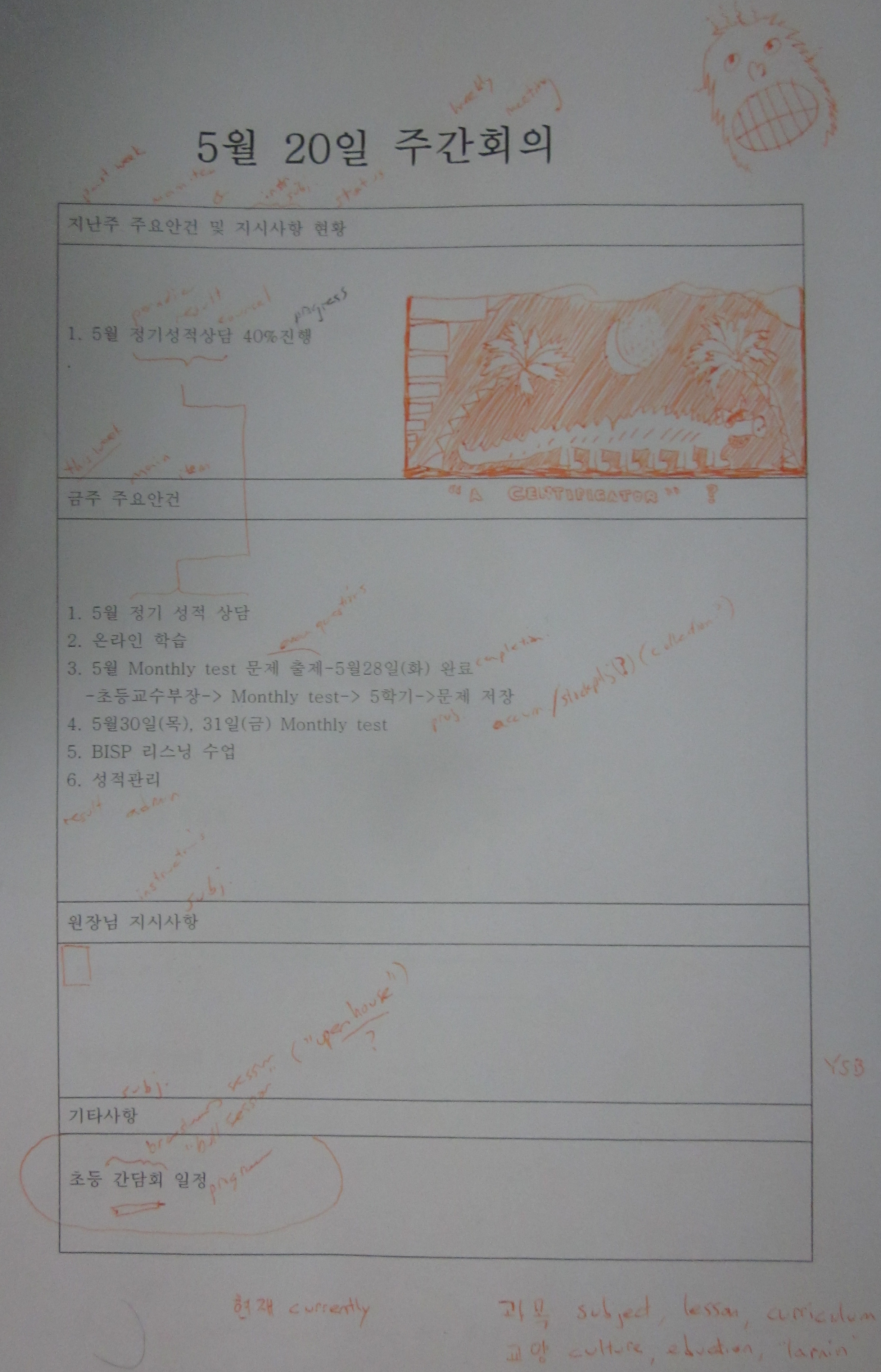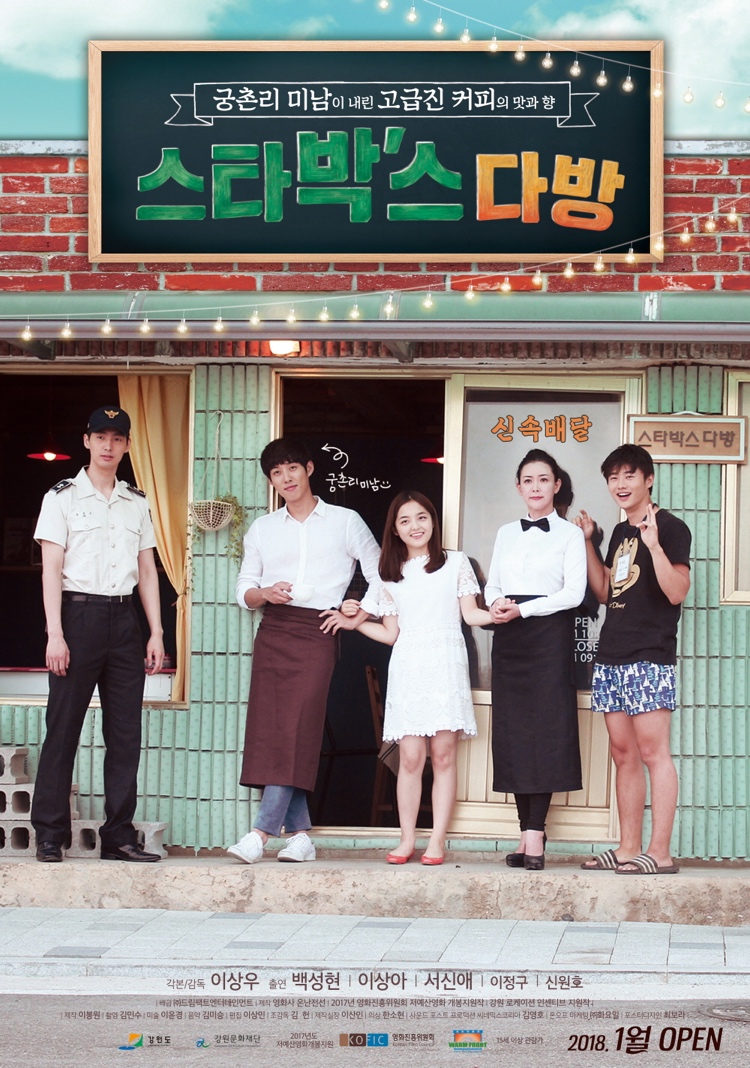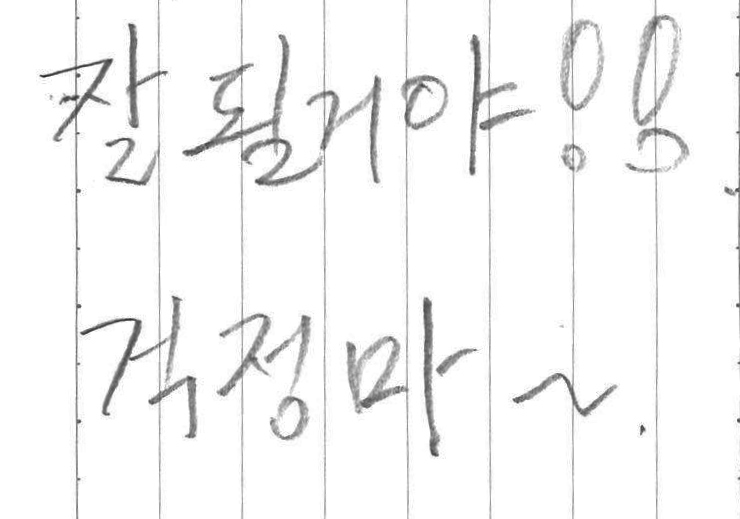I found this aphorism in my book of Korean aphorisms.
나무도 쓸만한 것은 먼저 베인다 na.mu.do sseul.man.han geos.eun meon.jeo be.in.da tree-EVEN useful-ADJ thing-be-PART first cut-PRES The tree that is useful is cut first.
I found this aphorism in my book of Korean aphorisms.
나무도 쓸만한 것은 먼저 베인다 na.mu.do sseul.man.han geos.eun meon.jeo be.in.da tree-EVEN useful-ADJ thing-be-PART first cut-PRES The tree that is useful is cut first.
I found this aphorism in my book of Korean aphorisms.
개도 싸다니면 몽둥이에 맞는다 gae.do ssa.da.ni.myeon mong.dung.i.e maj.neun.da dog-TOO wander-COND stick-WITH beat-PRES If a dog wanders, it's beaten with a stick.
I’m not sure this is true as much in US culture as in traditional Korean culture. Dogs are much lower on the social totem pole in Korean culture, traditionally. The lowest dogs are often on the level of the social order where they are ranked equal to “lunch” – that is to say, dogs are food. This is not so true anymore. It’s not illegal to eat dog meat in Korea, so there are traditionalists who do it, but in general dogs are kept as pets no different from the way they are in the US, these days. But that’s not where this aphorism comes from.
Anyway, a wandering dog will be beaten with a stick. That’s clear – what’s it mean? It seems to be associated with the fact that people who bum around and don’t stick to one place and one activity are likely to be treated badly – legitimately so: itinerants deserve their fate.
![]()
I learned this aphorism from my book of Korean aphorisms.
베어도 움 돋이 be.eo.do um dod.i cut-INF-CONCES bud sprout-ADV Though [it's] cut, [it sprouts] like a bud sprouting.
This has an interesting grammar as far as I can figure out – there’s no main verb, really. The main verb (at the end) is instead in an adverbial form (the -이 ending). So really it’s something like “Though you cut it, the bud a-sproutingly…”. That’s the most I can get out of my grammar book – though I concede I’m a bit rusty on navigating these things – this is my first Korean aphorism in a year and a half.
I think the best contemporary parallel aphorism in English is the infamous whack-a-mole meme. You can’t get rid of a problem by hacking off buds – you’ve got to tackle it by the roots.
So I was surfing the internet to random linguistics things – as one does – when I ran across this youtube video of a guy giving a passionate speech in seemingly entirely spontaneous Latin. He’s not what you would call a first-langage native speaker of Latin, obviously (there’s no such beast), but he’s definitely what one would classify as a fully fluent second language speaker of it. His Latin is “accented” by his first language (Italian) – but anyway, most fluent Latin speakers speak what is called “church Latin” which is essentially what we might think of as “Latin with an Italian accent”.
I suppose this intrigued me because I studied Latin while in high school, and subsequently was in essence a student of Romance Philology at the University of Pennsylvania, in my graduate program in Spanish Literature and Linguistics. I was required to take Spanish philology, which included being able to negotiate texts in late Iberian Latin and Old Spanish, as well as familiarize myself with other languages that influenced the Spanish Language’s evolution: Arabic, Gothic, “Celtiberian”, Basque, etc. I also had to take a “reading exam” in French (quite hard for me – my high school French was originally poor and rusty too) and Portuguese (less hard – I’d studied Portuguese some).
The epiphany that struck me as I watched this man speechifying in Latin was that in fact, I understood him better than I would a similar speech in Korean. The combination of my fluency in Spanish, my familiarity with other Romance languages like French, Portuguese and Italian, and my original fairly strong Latin from high school served well enough to make a lot of sense out of what the man was saying. I couldn’t necessarily give a summary of his ideas, but I could at least gather topic to some extent, and catch lots of individual concepts. My Korean comprehension isn’t quite that good – even though I lived in Korea for more than a decade and several times dedicated myself to formal instruction in Korean (maybe a cumulative of 2 years worth of college-level Korean).
This is of course a bit depressing, given my publicly visible “revised bucket list“. I haven’t been doing much Korean study, these days.
![]()
This tree (on monotone palmtree the right, a bit hard to see) was something I drew on an agenda handout during a boring staff meeting in May, 2013, to provide some shade for a creature I invented called a centipigator.

Here is the entire agenda. You can see how I diligently went through and glossed all the items (Korean-to-English) – I was in one of my phases where I was more hardcore about my efforts to learn Korean.

ㅁ 선생님, 왜요? 숙제 할수없어요. 그래서 미안.
– a pseudo-haiku in pseudo-Korean – because I sometimes still dream I’m in a classroom in Korea. Here is an English-version pseudo-haiku, which approximates the meaning.
ㅁ But, teacher, why me? I couldn't do my homework. So, sorry for that.
지금 듣고있는 것.
지금 듣고있는 것.
저문 저 하늘에
흐트러진 내가 비쳐 보인다
어쩌면 이 어둠은
거울과 닮아있는 듯해
어지럽게 차오른 호흡들과
흔들리는 모든 세상 속에서
날 부르는 듯
붉은 석양이 떠올라 오네
You make me back
woo woo woo woo woo yeah
You make me back
woo woo woo woo woo yeah
You make me back
woo woo woo woo woo yeah
You make me back
woo woo woo woo woo yeah
돌아갈 곳 난 없어
기대 쉴 곳 난 없어
그저 어둠 속에 나를 묻어 버릴 때
잿빛 세상을 깨고
날 불러오는
너의 목소리
You make me back
woo woo woo woo woo yeah
You make me back
woo woo woo woo woo yeah
You make me back
woo woo woo woo woo yeah
You make me back
woo woo woo woo woo yeah
지친 내 발걸음이 혼자 남아
갈 곳을 잃을 때
저문 하늘의 석양처럼 날
불러줘
날 깨워줘
You make me back
woo woo woo woo woo yeah
You make me back
woo woo woo woo woo yeah
Not what you think. Though I have been dealing with mosquitoes, lately.
I was waxing nostalgic this morning, because while doing some routine maintenance on this here blog thingy™, I ran across this unexpectedly well-made video I put together while sitting in a hotel room in Japan in September, 2009 (below). The music aspect is from a kids musical about a mosquito that I had seen earlier that year, starring one of my students.
It occurs to me that most of these students are finished with college, now. I know this for a fact, as I’m still in touch with a few of them.
What I’m listening to right now.
There is a joke about the importance of punctuation in English. It contrasts different meanings that the same words can have with only changes to punctuation:
Let’s eat, Grandma!
Let’s eat Grandma!
Well, Korean has a similar issue, but at the level of spacing between words, which normally is a bit of a gray area in Korean orthography – I have the impression there is a lot of variability in how individuals choose to space things like the case clitic particles – do they attach to their respective nouns or float freely?
But sometimes, spacing can change meanings. Hence this joke in Korean:
아기 다리 고기 다리 던소풍!
agi dari gogi dari deonsopung!
Baby legs, meat legs, dawn picnic!
아 기다리고 기다리던 소풍!
a gidarigo gidarideon sopung!
Ah, I’ve been waiting and waiting for a picnic!
The syllables are all the same. But depending on where you put the spaces between the words, you might or might not eat the baby.
What I’m listening to right now.
Cash, my work and my benz
Now I’m guilty I’m dead
Cash makes you and my pain
But I love it. I’m dead
Cash, my love and my fams
So I love u my dad
Cash loves you and my back
But bitch I hate myself
Cash, my work and my benz
Now I’m guilty I’m dead
Cash makes you and my pain
But I love it. I’m dead
Cash, my love and my fams
So I love u my dad
Cash loves you and my back
But bitch I hate myself
돈 땜에 살어 돈 땜에 죽어
돈 땜에 울어 돈 땜에 헤매
돈 땜에 무려 돈 때론 무력
돈 빼면 무력 돈 땜에 숙여
돈, 돈, 돈, 돈 땜에 두려워
돈이면 돼요 돈 이게 사기템
돈이면 계속 멋지게 살어 damn
돈은 공평한데 때론 차별해 어때
돈을 자비롭지 근데 잔인해 어때
때 때 난 겁이나 법이나 정이나 없대 돈 앞에는
But u stop that 탓 돌리기는 돈 잘못 없대
난 익히 들어 이미 자본에 백기 들어서
여기 털어 먼지 안 나는 사람 없다라고 들었어
나는 get cash
당연히 때 탔지
Oh my god, gash
난 가끔 놀라 많이
나는 get flash
돈은 나빠 마치
우린 돈을 많이 닮아가는 거지
Cash, my work and my benz
Now I’m guilty I’m dead
Cash makes you and my pain
But I love it. I’m dead
Cash, my love and my fams
So I love u my dad
Cash loves you and my back
But bitch I hate myself
Please you be patient
오우 야, 난 참지 못해 그지
멍청한 걸 어쩌라고
Make more money make more cash ya
오우 야, 난 참지 못해 그지
돈이 최고 새꺄 돈 앞에서 부족하지 돈이 나는
오우 야, 난 참지 못해 그지
공평한 게 없다면 난 가져갈게 나의 무길 다시
오우 야, 난 막지 못해 그지
이게 나의 탓이라면 돈에 탓을 물게 대신 다시
Oh I’m bitch
돈의 노예 나는
나는 겉만 번질
속이 썩어 가지 나는
오 아버지
도와줘요 나를 제발
Go set bungy
돈 번 뒤의 모습에
난 죄책감에 절어
Hey cash, where are you from? I don’t know
Hol’up
거짓말이 돈이 되길 빌어 cause we gonna earn
So I love errbody I love it
But bitch I hate myself
Cash, my work and my benz
Now I’m guilty I’m dead
Cash makes you and my pain
But I love it. I’m dead
Cash, my love and my fams
So I love u my dad
Cash loves you and my back
But bitch I hate myself
But bitch I hate myself
What I’m listening to right now.
별로 감흥 없어 너의 timeline
살아온 환경 완전히 달라
네가 놀 만큼 놀아봤을 때 I I graduate
너에게 끌린 날 반성하고 개조해
너의 실물 본 적이 없지
화장하기 귀찮아서 피한걸 수도
이런 내 솔직함에 네 마음이 얼 수도 있지만
이게 난데 어쩔 수 없죠
How you doing? 바빠
운동하고 작업실
주말엔 행사 끝나고 관리를 받았지
stylist 언니랑 촬영 전에 피팅
아무것도 안 해 제일 중요한 음악 없인
너랑 연락하는 1분 1초가 아까워
그 시간에 내게 도움 되는 거랑 할 거 하면
너랑 비교도 안 될
좋은 남자가 손만 뻗으면 있어
uh 점점 가까워져
연애
굳이 겪고 싶지 않은 문제
끝까지 남겨놓을 풀기 싫은 숙제
you love cats
you love girls
like my exes so no no no no no no
너 그리고 너
굳이 겪고 싶지 않은 문제
끝까지 남겨놓을 풀기 싫은 숙제
you love cats
you love girls
like my exes so no no no no no no
여자 Sandy 말고 사랑해줘 my voice
관심 없어 uh boys
너네 다 돌멩이로 보여
내 맘이고 내 선택이야 my life my choice
여자 Sandy 말고 사랑해줘 my voice
관심 없어 uh boys
너네 다 돌멩이로 보여
내 맘이고 내 선택이야 my life my choice
생각해봐 이 별의 인구의
반이 남자인데 때 되면 생겨 남자친구
당분간 우리 횟집 쉬어요
nah nah 이제 안 해 물고기 취급
감당할 자신 있으면 들어와
팔자 세요 괜찮으면 옆으로 와
대신 내가 너 보다 잘나간다고
자존심 세우며 질투하거나 부러워마
멀티가 좀 어려워 지금은
일 일 일 일 해야 해
어리광 부리는 동안 나 앞서나간 쟤네
kill kill kill kill 해야해
멀티가 좀 어려워 지금은
일 일 일 일 해야 해
어리광 부리는 동안 나 앞서나간 쟤네
kill kill kill kill 해야해
연애
굳이 겪고 싶지 않은 문제
끝까지 남겨놓을 풀기 싫은 숙제
you love cats
you love girls
like my exes so no no no no no no
너 그리고 너
굳이 겪고 싶지 않은 문제
끝까지 남겨놓을 풀기 싫은 숙제
you love cats
you love girls
like my exes so no no no no no no
여자 Sandy 말고 사랑해줘 my voice
관심 없어 uh boys
너네 다 돌멩이로 보여
내 맘이고 내 선택이야 my life my choice
여자 Sandy 말고 사랑해줘 my voice
관심 없어 uh boys
너네 다 돌멩이로 보여
내 맘이고 내 선택이야 my life my choice
여자 Sandy 말고 사랑해줘 my voice
관심 없어 uh boys
너네 다 돌멩이로 보여
내 맘이고 내 선택이야 my life my choice
여자 Sandy 말고 사랑해줘 my voice
관심 없어 uh boys
너네 다 돌멩이로 보여
내 맘이고 내 선택이야 my life my choice
I like watching Korean music-contest shows. The artist above emerged on a show called “High School Rapper” (고등래퍼), e.g.
Here is an aphorism from my book of Korean aphorisms.
속다르고 겉다르다
sok.da.reu.go geot.da.reu.da
inside-be-different-CONJ outside-be-different-PRES
The inside and outside are different.
This refers to a two-faced person, someone who is not who they seem or pretend to be.
![]()
Here is an aphorism from my book of Korean aphorisms.
식충이다
sik.chung.i.da
food-worm-BE-INF
[He] is a food-eating worm.
The type of worm is the round worm – an intestinal parasite. Said of a good-for-nothing fellow. We say in English, too: “He’s a parasite.”
![]()
Here is an aphorism from my book of Korean aphorisms.
지리산 포수
ji.ri.san po.su
Jiri-Mountain hunter
[That’s like] a hunter at Jiri Mountain.
Jiri Mountain, in the south center of the peninsula, long ago was famous for being inhabited by fierce tigers. So a hunter at Jiri Mountain probably never returns, but is killed and eaten by tigers. This is said of someone who is lost forever, perhaps due to his own foolishness.
![]()
Here is an aphorism from my book of Korean aphorisms.
차면 넘친다
cha.myeon neom.chin.da
be-full-IF overflow-PRESENT
It [something] is full, it overflows.
This seems quite straightforward – “one’s cup runneth over,” perhaps. But also, it seems to mean simply, “all things pass,” or “all good things come to an end.”
![]()
Here is an aphorism from my book of Korean aphorisms.
극락길을 버리고 지옥길로 간다
geuk.rak.gil.eul beo.ri.go ji.ok.gil.ro gan.da
heaven-road-OBJ abandon-CONJ hell-road-BY go-PRESENT
[One] abandons heaven’s road and goes along hell’s road.
A fool will leave the straight and narrow path to heaven and travel the road to hell instead. Note that these conceptions of heaven and hell are not at necessarily linked to Christian cosmology, but long existed in Buddhist and even shamanistic cosmological traditions.
![]()
Here is an aphorism from my book of Korean aphorisms.
벌인 춤이다
beol.in chum.i.da
begin-PPART dance-COPULA
[It] is a dance begun.
The dance has already started, therefore it must be completed. Something started with anticipation or hope or pleasure must be carried through even if the initial enthusiasm is lost. Perhaps this is analogous to the fallacy of sunk costs, when “cutting one’s losses” is unthinkable.
![]()
Here is an aphorism from my book of Korean aphorisms.
음삭은 갈수록 줄고 말은 갈수록 는다
eum.sik.eun gal.su.rok jul.go mal.eun gal.su.rok neun.da
food-TOPIC over-time decrease-CONJ word-TOPIC over-time increase-PRESENT
Food decreases over time and words increase over time.
This is a reference to the way that rumors are augmented as they are passed along person-to-person – unlike food, that is consumed as it is passed person-to-person. “Rumor grows as it goes.”
![]()
Here is an aphorism from my book of Korean aphorisms.
입살이 바살이라
ip.sal.i bo.sal.i.ra
mouth-SUBJ bodhisattva-BE-QUOT
“[As if your] mouth were a bodhisattva.”
A bodhisattva is a Buddhist saint. One would normally pray to a saint for help in some difficult thing, using certain types of Buddhist prayers. This is about uttering such prayers but devoid of target – just speaking as if the words themselves would make it true. That is, to speak as if words had the power to make something true. “If words were magic…”. “If wishes were fishes…”
![]()
Here is an aphorism from my book of Korean aphorisms.
마른 나무 좀먹듯
ma.reun na.mu jom.meok.deut
be-dry-GER tree moth eat-AS-IF
[…] like a moth eating a dry tree.
Apparently this means to be consumed either by a physical ailment or by stress and anxiety. I’m not sure off the top of my head what an equivalent English language saying might be.
![]()
I found this aphorism in my aphorism book.
남의 바지 입고 새 벤다
nam.ui ba.ji ip.go sae ben.da
otherpeople-POSSESSIVE pants wear-CONJ grass cut-PRESENT
[One] wears another’s pants and cuts grass.
This means to benefit by using other people’s things. The word 새 was difficult here. Apparently it can mean “grass” but I didn’t find any Korean-English dictionary telling me so. Nor did I find it in any Korean-Korean dictionary. However, I found many sentences translated online where the word was clearly used to mean “grass.” I suspect it’s a Chinese word, and not, strictly speaking, Korean. It may be seen as archaic or something.
![]()
This aphorism was in my book of Korean aphorisms.
바람 부는대로 물결 치는대로
ba.ram bu.neun.dae.ro mul.gyeol chi.neun.dae.ro
wind blow-AS wave surge-AS
[Go] as the wind blows, as the waves surge.
Basically, this seems to mean, “Go with the flow.”
Good idea.
![]()
Here is an aphorism from my book of Korean aphorisms.
호박이 떨어졌다.
ho.bak.i tteol.eo.jyeoss.da
pumpkin-SUBJ fall-PAST-SIMPLE
A pumpkin has fallen.
This means one has received an unexpected windfall or good fortune.
![]()
Here is an aphorism from my book of Korean aphorisms. I haven’t done one in a while.
산에 가야 범을 잡는다
san.e ga.ya beom.eul jap.neun.da
mountain-TO go-ONLY-IF tiger-OBJ catch-PRES
[You] catch a tiger only if [you] go to the mountains.
Nothing ventured, nothing gained.
One reason I enjoy my friend Peter’s company is that we both have a rather geeky, quasi-philological approach to the Korean language. This is not necessarily the best approach to language learning, but it is what it is.
Our neighbor Jeri brought by some home-made kimchi that had been given to her by another friend of hers. Just imagine: Alaska-made kimchi – such is globalization. To taste-test the kimchi, I broke out my stash of Korean style spicy ramen, of the famous brand 신라면 [sinramyeon]. As Peter and I ate kimchi with spicy instant ramen for lunch, we ended up speculating on the Chinese character, 辛, prominently displayed as the brand mark for the product, as in this picture below.

We both assumed it meant “new” – the most common stand-alone meaning for the Korean syllable 신 [sin]. I also speculated it might be a family name. But neither of those are the case. After a bit of searching on the online naver.com dictionary (the best online Korean dictionary) we found that in fact the definition is given as follows:
1. 맵다 2. 독하다(毒–) 3. 괴롭다, 고생하다 4. 슬프다 5. 살생하다(殺生–) 6. 매운 맛 7. 여덟째 천간(天干) 8. 허물, 큰 죄(罪) 9. 새, 새 것(=新)
That definition #1? “Spicy.”
So in fact sinramyeon means exactly what the English label says: “spicy ramen.”
The kimchi, by the way, was quite acceptable.
Later, Peter and I drove down to Hydaburg, to look at totems and witness the isolated, mostly-native Haida village. We saw bilingual street signs.

It rained all day.
After that, on the way back home, we stopped and saw the totems in Klawock, too. Peter gave a stump speech in the Klawock city park.

I have been neglecting my Korean aphorisms, for this past year. That should change – just because I’ve left Korea doesn’t mean I intended to abandon the Korean language.
I’ll try to return to a once-a-week habit. Saturday seems like a good day to make “aphorism day.” Here, then, is a Korean aphorism from my book of aphorisms, and relevant to my new lifestyle.
누은나무에 열매 안연다
nu.eun.na.mu.e yeol.mae an.yeon.da
lying-tree-FROM fruit NOT-open
A fallen tree does not yield fruit.
I am of some doubt about what verb it is at the end. The best guess is 열다, “open,” conjugated in the plain present indicative. The dictionary doesn’t suggest that “yield” (as in yield/give fruit or profits) as a possible meaning. But I could see it as an extended meaning, metaphorically, in the sense that a tree “opens up” and gives its fruit.
The aphorism book suggests the pragmatic meaning is parallel to “nothing ventured, nothing gained.” I’m not sure I quite see that, but I guess so. I would rather imagine the point being that you have to think about the future – if you cut the tree now, you’ll not get any fruit in the future. That’s not exactly the same as “nothing ventured, nothing gained.” But it’s related.
Regardless, I think the aphorism-creator wasn’t thinking of all the firewood you can get. I speak from experience.
삶
사람들은 때때로
수평선이 될 때가 있다
사람들은 때때로
수평선 밖으로 뛰어내릴 때가 있다
밤이 지나지 않고 새벽이 울 때
어머니를 땅에 묻고 산을 내려올 때
스스로 사랑이라고 부르던 것들이
모든 증오일 때
사람들은 때때로
수평선 밖으로 뛰어내린다
– 정호승 (한국시인 1950-)
Life
Occasionally there are times
when people turn into horizons.
Occasionally there are times
when people leap beyond the horizon.
When dawn arrives before night has passed,
when descending the hills after burying one’s mother,
When things that once called themselves love
are all of hatred,
Occasionally people
leap beyond the horizon.
– Jeong, Ho-seung (Korean poet, b 1950) (Translated by Anthony of Taizé and Susan Hwang)
Having nothing better to do on the 15 hour transpacific flight, I happened to stumble across the fact that the Air Canada movie selection included quite a few foreign films – including 4 Korean movies.
I decided somewhat arbitrarily that transpacific flights should include Korean movies (such movies have been included, so often, in the past, because my most frequent transpacific carrier has been Korean Airlines).
So I binged on Korean movies. No comment with respect to quality – this is not, nor has it ever been, a movie review blog. You can find summaries and reviews elsewhere, better than anything I could write.
But I enjoyed watching them – a few hours of immersion in Korean culture, absent from my day to day life since last summer.
The movies I watched:

돌아와요 부산항애 – a violent cops and robbers thriller where the two antagonists (cop and robber) are twin brothers.

스타박스다방 – a comedy involving a guy starting a coffee shop in a small coastal village in Korea, where many of the characters die at the end.

선명탐정: 흡혈괴마의 비밀 – an anachronistic comedy adventure involving vampires in Joseon Era Korea (1700s).
ㅁ 매미들은 "잘가" 노래했다. 그러서 눈물을 머금었다.
– a free-form poem. The Korean translates, roughly, as “The cicadas sang farewell / so [my eyes] shed tears.”
Curt and I were discussing my situation and imminent departure, and all the accompanying uncertainties.
He used the phrase, 잘될거야! 걱정마~ which he helpfully wrote down for me because he knows I learn best visually.

I more or less understood it but had never tried to parse it grammatically.
잘될거야! 걱정마
jal.doel.geo.ya geok.jeong.ma
well-become-FUT-BE-FAM(?)! worry-DON’T
It’ll turn out alright. Don’t worry.
The “-야” verbal ending (not to be confused with vocative -야, which attaches to nouns) is one that I see and hear all the time, but I’ve never seen it explained in any of my grammar books. I’ve labeled it “BE-FAM” above, for “BE, familiar” – meaning it seems to be a kind of slangy version of the copula that does’t get explained in grammar books. Or maybe I’m wrong and it’s something else, but anyway, I get the meaning of it.
Later I accused him of “irrational optimism,” which he took badly, but in fact I see that as a positive trait: irrational optimism is stronger than rational optimism, because the latter is subject to sudden dissolution in the face of facts.
[daily log: walking, 7.5km; carrying heavy box to post office, 0.5km]
I found this aphorism in my book of aphorisms.
새도 가지를 가려 앉는다
sae.do ga.ji.reul ga.ryeo anj.neun.da
bird-EVEN branch-OBJ be-picky-FIN sit-PRES
Even a bird is picky [when choosing] a branch to sit on.
This advocates for the thoughtful, intentional life, I think. One should choose one’s place, setting, friends, career with care.
I’m not sure what an equivalent English aphorism might be.
[daily log: walking, 7km]
Sometimes my middle school students talk to me in Korean, even though they’re perfectly capable of expressing themselves in English. Partly, this is to indicate a different pragmatics: it shifts control of the discourse from me to them, since I’m the one with limited Korean ability. I think they derive some satisfaction from that. So, especially during times of just chatting or joking around, they’ll start talking in Korean, but still talking to me. This is remarkable, because half the time I don’t understand them, but I fake it pretty well, and I guess they enjoy the notion that they’re “teaching” me, too.
On Friday night, some girls in my HS2M cohort had the giggles. Well, certain types of 8th grade girls often have the giggles. I said, somewhat jokingly, “Are you going to stop laughing? Ever?”
One girl, Gayeong, said, painting a serious face for just a very short time, “But, Teacher! I have 웃음조절장애!”.
I laughed pretty hard. “웃음조절장애” means, roughly, “Laughter control disability” – with the same formal or vaguely medicalized discourse level. It’s the way a Korean child psychologist might talk about it, if it were considered an actual disability. So it was a joke.
I’ll have to remember the experession.
[daily log: walking, 1km]
My Korean cellphone service provider, KT (Korea Telecom) likes to send me public service announcements via text message. Mostly these seem useless – though one time it warned of some flooding up in Paju, where I might, conceivably, have been going. Mostly I just scan the messages and try to get the gist of them, and then delete them.
I got one a while back that had me stumped. It said:
[Web발신]
검찰, 경찰, 금감원을 사칭하여 현금이나 계좌이체를 요구하면 100% 보이스피싱!
I read the message, and despite having a general idea of the gist of the message – something about inappropriate impersonation of police or prosecutors, some kind of warning about a scam – I nevertheless was unable to the parse the last word. That last term was "100% 보이스피싱!" – well, the transcription would be [bo.i.seu.pi.sing], which I knew would be some kind of English borrowing – the last syllable -싱 [-sing] gives it away, since it's a fairly rare syllable in Korean, and certainly doesn't occur at the end of words. It was clearly the English "-ing" ending, which the Koreans love to borrow, sometimes inappropriately. But sounding it out, the best I could come up with was "boys pissing". Unfortunately, that seemed like an unlikely bit of English borrowing for a public service announcement from my cellphone carrier. Were people impersonating boys pissing? Was this a problem?
After having given up on figuring it out on my own, I plugged it into the googletranslate, which gave me the obvious choice: "voice phishing". It was a warning about voice-phishing, not about boys pissing.
I think it was more interesting, before. Although kinda weird, right?
[daily log: walking, 7km]